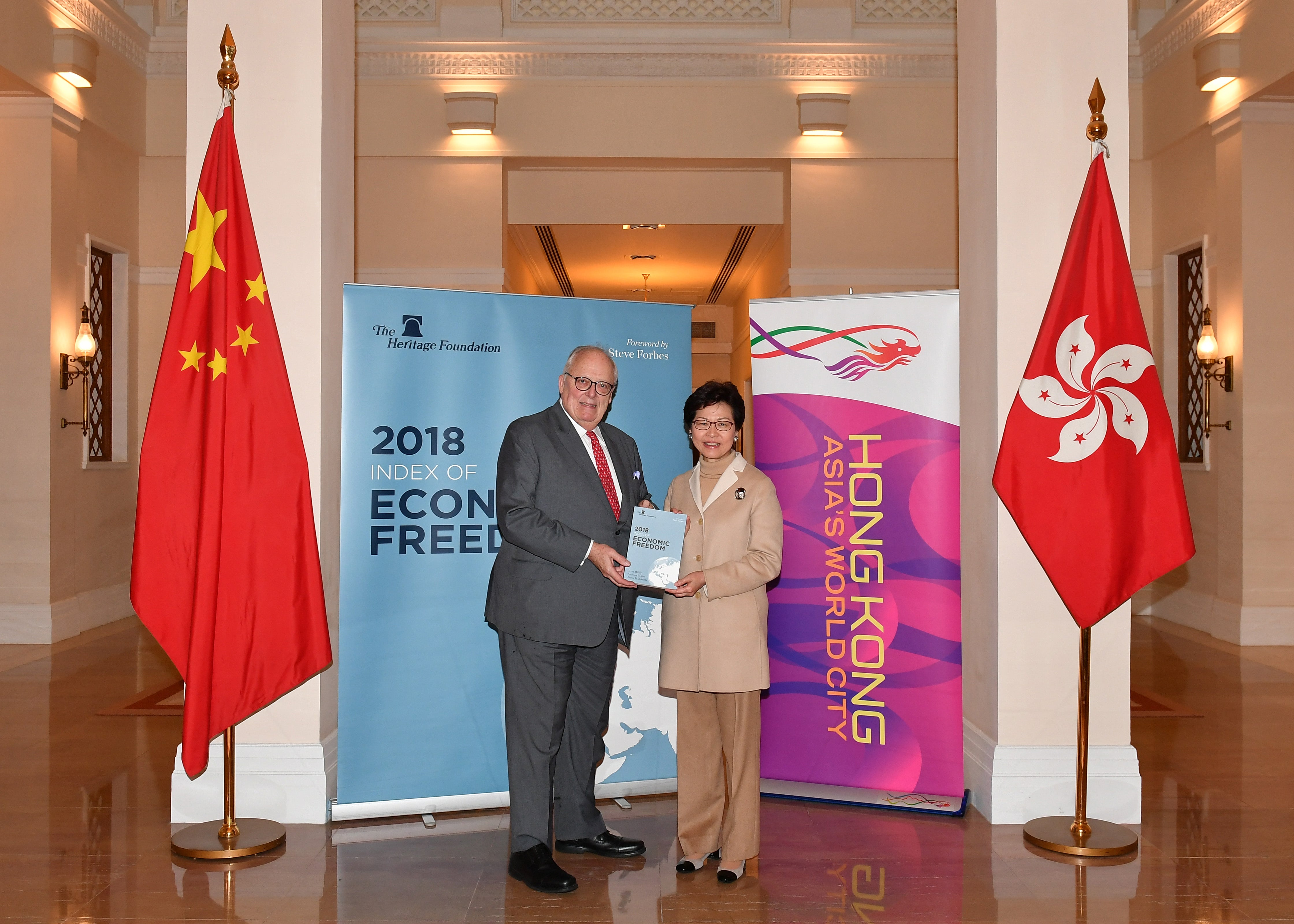The world economy is “moderately free,” with another rise in economic liberty leading to a sixth annual global increase, according to the editors of the 2018 Index of Economic Freedom, released today by The Heritage Foundation.
The world average score of 61.1 is the highest recorded in the 24-year history of the Index. The world average is more than three points higher than that recorded in the first edition of the Index in 1995.
>>> Check out the full 2018 Index of Economic Freedom
Among the 180 countries ranked, scores improved for 102 countries and declined for 75. Only three remained unchanged.
Six economies earned the Index’s designation of “free” (scores of 80 or above), while the next 90 are classified as “mostly free” (70-79.9) or “moderately free” (60-69.9).
“Thus, a total of 96 economies—more than half of all nations and territories graded in the 2018 Index—provide institutional environments in which individuals and private enterprises benefit from at least a moderate degree of economic freedom in the pursuit of greater economic development and prosperity,” the Index editors write.
Yet the number of economically “unfree” economies remains high: 63 are considered “mostly unfree” (50-59.9) and 21 are “repressed” (scores below 50).
Per capita incomes are much higher in nations that are more economically free, the Index editors note. Economies rated “free” or “mostly free” in the 2018 Index enjoy incomes more than double the average levels in other countries, and more than five times higher than the incomes of people living in “repressed” economies.”

HONG KONG—Dr. Edwin Feulner, founder of The Heritage Foundation, presents a copy of the 2018 Index of Economic Freedom to Carrie Lam, Chief Executive of Hong Kong SAR. For the 24th year in a row, Hong Kong’s economy is rated as the world’s freest.
The United States managed to halt its recent slide, recording a score of 75.7, more than half a point above its 2017 score (its lowest score in Index history). Ranked No. 18 globally, it remains “mostly free” and rose in the regional rankings, thanks in part to a 1.3-point decline in Chile’s score, to become the second-freest economy in the Americas region (behind Canada, which dipped to 9th place globally). “The decade-long decline in America’s economic freedom may have been halted,” the editors write.
Hong Kong and Singapore each logged increases in their Index scores, finishing first and second in the rankings for the 24th consecutive year. Three other frequent top 10 finishers -- New Zealand (3rd globally), Switzerland (4th) and the United Kingdom (8th) -- also saw their scores rise, though not nearly as much as Ireland (6th), which saw a 3.7-point increase.
Despite a modest 0.1-point dip in its score, Australia retained its hold on the No. 5 spot globally. Estonia’s score dropped as well, by 0.3 points, to give the former Soviet state a 7th place finish. Last year’s surprise newcomer to the top 10, the United Arab Emirates, improved its Index score by 0.7 points to take the 10th spot.
The Most Free
1.
2.
3. New Zealand
4. Switzerland
5. Australia
6. Ireland
7. Estonia
8. United Kingdom
9. Canada
10. United Arab Emirates
The Least Free
180. North Korea
179. Venezuela
178. Cuba
177. Rep. of Congo
176. Eritrea
175. Equatorial Guinea
174. Zimbabwe
173. Bolivia
172. Algeria
171. Djibouti
Launched in 1995, the Index evaluates countries in four broad policy areas that affect economic freedom: rule of law; government size; regulatory efficiency; and open markets. There are 12 specific categories: property rights, judicial effectiveness, government integrity, tax burden, government spending, fiscal health, business freedom, labor freedom, monetary freedom, trade freedom, investment freedom, and financial freedom. Scores in these categories are averaged to create an overall score.
Based on an average score, each of 180 countries graded in the 2018 Index is classified as “free” (i.e., combined scores of 80 or higher); “mostly free” (70-79.9); “moderately free” (60-69.9); “mostly unfree” (50-59.9); or “repressed” (under 50).
The Index groups the world’s countries into five regions: the Americas, Asia-Pacific, Europe, Middle East/North Africa and Sub-Saharan Africa. Individual rankings and write-ups for each country can be found online at heritage.org/index/ranking.
Americas (15 economies improved, 17 declined):
- The Americas has no “free” economies. Three (Canada, Chile, United States) are “mostly free.” Five (Ecuador, Suriname, Bolivia, Cuba, Venezuela) are “repressed.” The remaining 24 are either “moderately free” or “mostly unfree.”
- Across the region, economies have expanded at an average rate of 1.7 percent over the past five years. The regional average rate of unemployment is 6.9 percent, while the average inflation rate is 14.4 percent.
- The rule of law and regulatory efficiency are major problem areas, reflecting long-standing weakness in the protection of property rights, ineffectiveness in the judiciary, and lack of government integrity.
Asia-Pacific (31 economies improved, 12 declined):
- Four of the world’s “free” economies are in this region (Hong Kong, Singapore, Australia, New Zealand), but so are three “repressed” economies (Timor-Leste, Turkmenistan, North Korea). Five are “mostly free” (Taiwan, Malaysia, South Korea, Japan and Macau).
- Many of the Asia-Pacific countries are performing well in controlling the size of government, maintaining the rule of law, and regulating economic activity efficiently, the Index editors note. The regional fiscal health and labor freedom scores are about five points above the world average.
Europe (32 economies improved, 11 declined, 1 unchanged, 1 ungraded):
- Eighteen of the world’s 34 freest economies (overall scores above 70) are in this region, and two of the six world economies rated as “free” (Switzerland and Ireland).
- Most of Europe’s economies rated either “mostly free” or “moderately free.” Five—Moldova, Russia, Belarus, Greece and Ukraine—are “mostly unfree.”
- The region’s average scores on property rights and investment freedom lead the world averages by more than 15 points, and it is at least 10 points ahead on judicial effectiveness, business freedom and several other measures. Yet Europe struggles with costly labor regulations, higher tax burdens, an expanding public sector, and a variety of market-distorting subsidies.
Middle East/North Africa (6 economies improved, 8 declined, 4 ungraded):
- The Middle East/North Africa has no “free” economies. Three (United Arab Emirates, Qatar and Israel) are “mostly free,” but most of the other 11 graded economies are either “moderately free” or “mostly unfree” (and one, Algeria, is repressed).
- Many countries in this region, the editors note, have been grappling since 2011 with fallout from socio-economic upheaval or outright conflict growing out of citizen’s demands for more freedoms. Private-sector growth lags far behind levels needed to provide adequate opportunities for growing populations.
- Middle East/North Africa does lead the world in one area, however: tax burden. Its score on this Index factor beats the world average by more than 10 points.
Sub-Saharan Africa (18 economies improved, 27 declined, 2 unchanged):
- Sub-Saharan has no “free” economies. Only one (Mauritius) is “mostly free,” with Botswana’s 0.2-point drop causing it to drop into the “moderately free” category. Most of the region’s 47 graded nations are “mostly unfree”, and more than half of the world’s “repressed” economies (12 out of 21) are in Sub-Saharan Africa.
- The population-weighted average GDP per capita is only $3,891, the lowest level for any region. Unemployment hovers at 7.5 percent.
- The single factor where Sub-Saharan Africa scores above the world average is government spending. But the region is plagued with a weak rule of law, inadequate protection of property rights, cronyism and endemic corruption.
“It is not massive redistributions of wealth or government dictates that produce the most positive social outcomes,” the editors write. “Instead, mobility and progress require lower barriers to market entry, freedom to engage with the world, and less government intrusion.”
The 2018 Index was edited by Ambassador Terry Miller, Director of Heritage’s Center for International Trade and Economics; Anthony B. Kim, Research Manager Center for International Trade and Economics; and James M. Roberts, Research Fellow for Economic Freedom and Growth in the Center for International Trade and Economics.
An interactive version of the Index, including full text, charts and graphs is available online at heritage.org/index. A hard-copy version totaling 470 pages may be downloaded there, as well.




